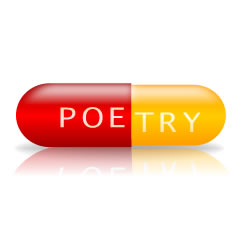 No, this is not an April fool’s post. Thanks to the Academy of American Poets, April is National Poetry Month, and apparently has been since 1996. Interestingly enough, according to some sources, April is also:
No, this is not an April fool’s post. Thanks to the Academy of American Poets, April is National Poetry Month, and apparently has been since 1996. Interestingly enough, according to some sources, April is also:
- Health Awareness Month
- National Blood Donor Month
- National Oral Health Month
Notice a pattern? I do. National months are only declared for causes that socially-minded people think ought to receive more attention. That is to say, they are things we should pay more attention to–like our health, giving blood, recognizing the plight of others–good, noble causes that would simply get swept by the wayside were it not for (and sometimes still in spite of) assigning this cause to one of the twelve calendar months in an attempt to raise awareness.
In marketing there is the taxonomy of medicine, vitamins and candy. Any product is usually most like one of these three. Plumbing services to fix a broken pipe, for example, are medicine–fulfilling an immediate, expressed need. Cable Television is mostly candy–entertainment that looks and tastes good. A gym membership would be like vitamins. And poetry, unfortunately, by virtue of having been trotted out in classrooms on its national month once a year for the past eleven years, has proved itself to also be perceived most like vitamins–good for you, and you know it–but an awful lot harder to sell than medicine or candy.
There are, of course, some exceptions. In some instances, poetry is combined with dramatic performance and/or music to essentially sugar-coat the pill. Most vitamin companies bring out colorful, fun-shaped chewable vitamins for the same reason–because what is seen as candy is easier to sell. Still, while added dramatic and musical elements may create greater excitement in the moment, rarely do the texts of such poetic performances actually stand up on the page. And no matter how loudly the audience cheers, the content of such performances tend to be forgotten almost immediately after the show. Like candy, they are designed to excite–not nourish–and the bursts of energy they provide are often equally short lived.
After September 11th, 2001 a number of poetry compilations came out trying to offer words of comfort for troubling times. Publishers saw an opportunity to reposition poetry as medicine to the mainstream culture. The ripple, however, was slight. Increasingly, people seem to have replaced any genuine sense of the need for poetry with a sense that they ought to at least appreciate it (heaven forbid actually liking the stuff). Generally, those that do regard poetry as medicine have come to it their own way, and do not represent the majority.
The exception to the rule of an individual and minority relationship to poetry as need rather than should can be seen in the steady rise in MFA programs all over the country–a vote of confidence for reading and writing poetry that is being backed by cold, hard tuition money. And I doubt very much that students are enrolling in MFA programs because they feel, like taking vitamins, that they “ought” to get an arts degree. Getting an MBA is something you “ought” to do as a sensible career move. An MFA, to its students, is more likely either medicine or candy. I know which one it is for me.
So, maybe there is hope brewing yet that poetry can emerge from the vitamin shelf and figure more prominently in people’s lives. Mark Twain called a classic, “A book which people praise and don’t read.” Poetry has too long been an entire genre of writing which people likewise respect but rarely read. Given how much poetry matters to the health of human culture, here’s hoping for a time when every month can be poetry month and poems are generally regarded as more palatable than swallowing a large, jagged pill.